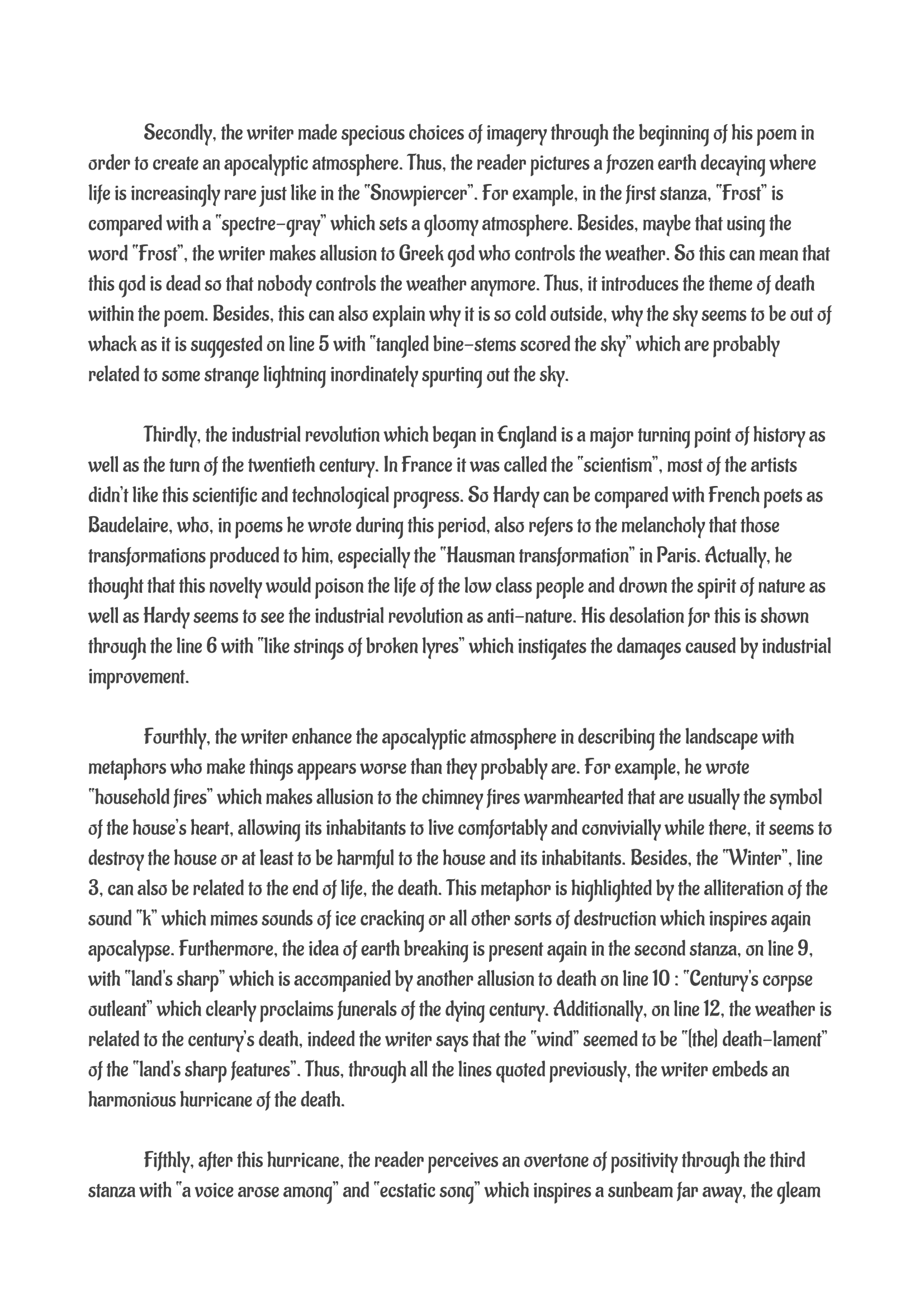Commentaire : "The darkling Trush"
Publié le 15/02/2015

Extrait du document
«
Secondly, the w riter m ade specious choices of im agery through the beginning of his poem in
order to create an apocalyptic atm osphere.
Thus, the reader pictures a frozen earth decaying w here
life is increasingly rare just like in the “Snow piercer”.
For exam ple, in the first stanza, “Frost” is
com pared w ith a “spectre-gray” w hich sets a gloom y atm osphere.
Besides, m aybe that using the
w ord “Frost”, the w riter m akes allusion to G reek god w ho controls the w eather.
So this can m ean that
this god is dead so that nobody controls the w eather anym ore.
Thus, it introduces the them e of death
w ithin the poem .
Besides, this can also explain w hy it is so cold outside, w hy the sky seem s to be out of
w hack as it is suggested on line 5 w ith “tangled bine-stem s scored the sky” w hich are probably
related to som e strange lightning inordinately spurting out the sky.
Thirdly, the industrial revolution w hich began in England is a m ajor turning point of history as
w ell as the turn of the tw entieth century.
In France it w as called the “scientism ”, m ost of the artists
didn’t like this scientific and technological progress.
So H ardy can be com pared w ith French poets as
Baudelaire, w ho, in poem s he w rote during this period, also refers to the m elancholy that those
transform ations produced to him , especially the “H ausm an transform ation” in Paris.
A ctually, he
thought that this novelty w ould poison the life of the low class people and drow n the spirit of nature as
w ell as H ardy seem s to see the industrial revolution as anti-nature.
H is desolation for this is show n
through the line 6 w ith “like strings of broken lyres” w hich instigates the dam ages caused by industrial
im provem ent.
Fourthly, the w riter enhance the apocalyptic atm osphere in describing the landscape w ith
m etaphors w ho m ake things appears w orse than they probably are.
For exam ple, he w rote
“household fires” w hich m akes allusion to the chim ney fires w arm hearted that are usually the sym bol
of the house’s heart, allow ing its inhabitants to live com fortably and convivially w hile there, it seem s to
destroy the house or at least to be harm ful to the house and its inhabitants. Besides, the “W inter”, line
3, can also be related to the end of life, the death.
This m etaphor is highlighted by the alliteration of the
sound “k” w hich m im es sounds of ice cracking or all other sorts of destruction w hich inspires again
apocalypse.
Furtherm ore, the idea of earth breaking is present again in the second stanza, on line 9,
w ith “land's sharp” w hich is accom panied by another allusion to death on line 10 : “Century's corpse
outleant” w hich clearly proclaim s funerals of the dying century.
A dditionally, on line 12, the w eather is
related to the century’s death, indeed the w riter says that the “w ind” seem ed to be “[the] death-lam ent”
of the “land's sharp features”.
Thus, through all the lines quoted previously, the w riter em beds an
harm onious hurricane of the death.
Fifthly, after this hurricane, the reader perceives an overtone of positivity through the third
stanza w ith “a voice arose am ong” and “ecstatic song” w hich inspires a sunbeam far aw ay, the gleam.
»
↓↓↓ APERÇU DU DOCUMENT ↓↓↓
Liens utiles
- Commentaire sur l'ouvrage de Quobna Ottobah Cugoano : Thoughts and Sentiments on the Evil of Slavery
- Commentaire affiche film The Shining
- Commentaire the great expectations
- commentaire the telle tale hearth
- Commentaire " The shape of Snakes "


